牛津译林版英语八年级上Unit 1 Friends知识梳理及练习(含答案)
文档属性
| 名称 | 牛津译林版英语八年级上Unit 1 Friends知识梳理及练习(含答案) | 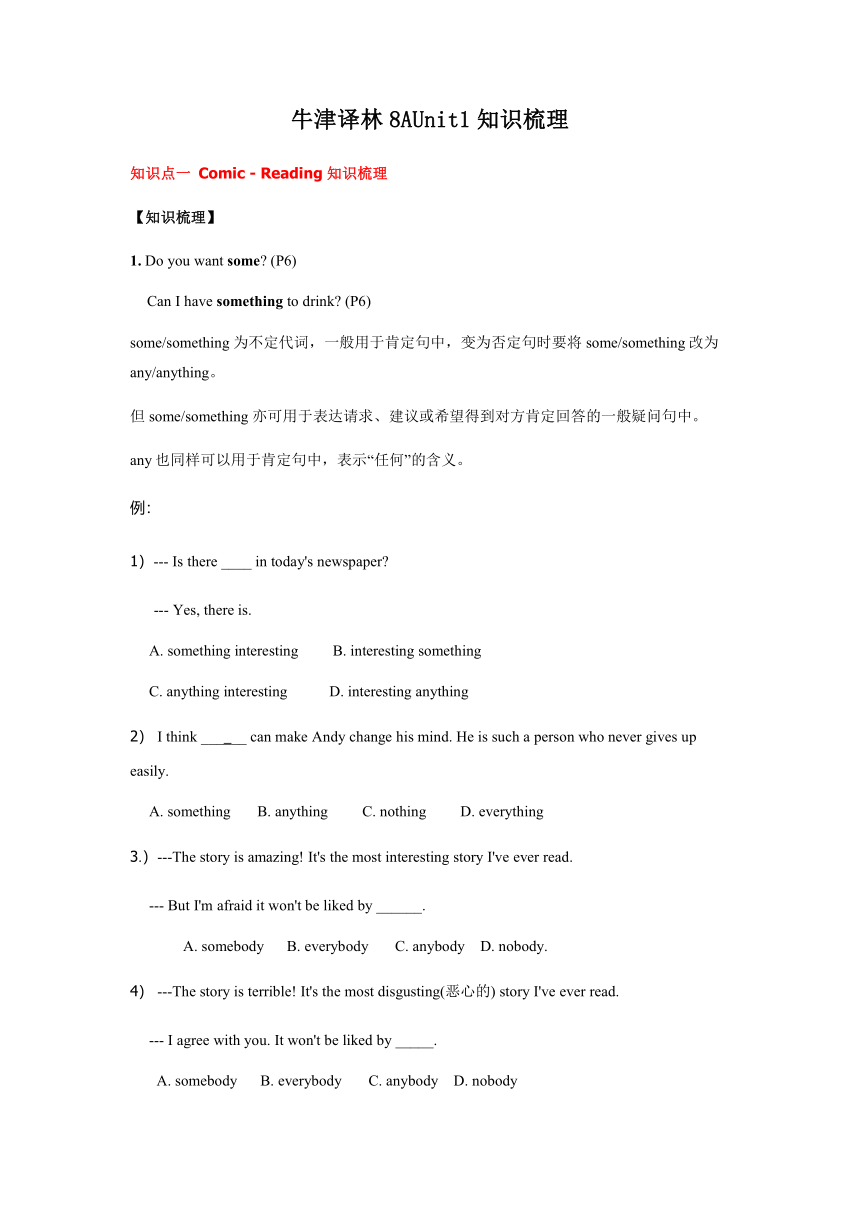 | |
| 格式 | docx | ||
| 文件大小 | 35.8KB | ||
| 资源类型 | 教案 | ||
| 版本资源 | 牛津译林版 | ||
| 科目 | 英语 | ||
| 更新时间 | 2020-10-09 22:21:45 | ||
图片预览

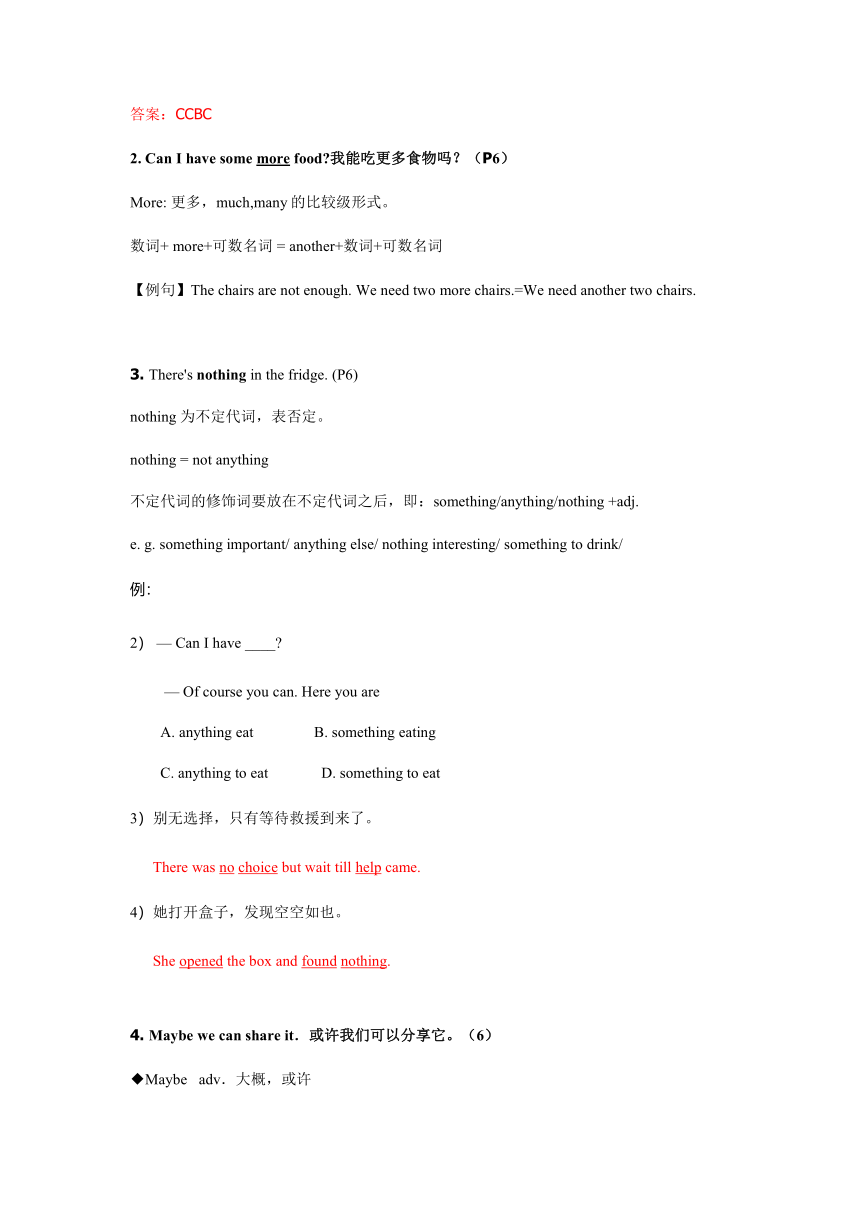
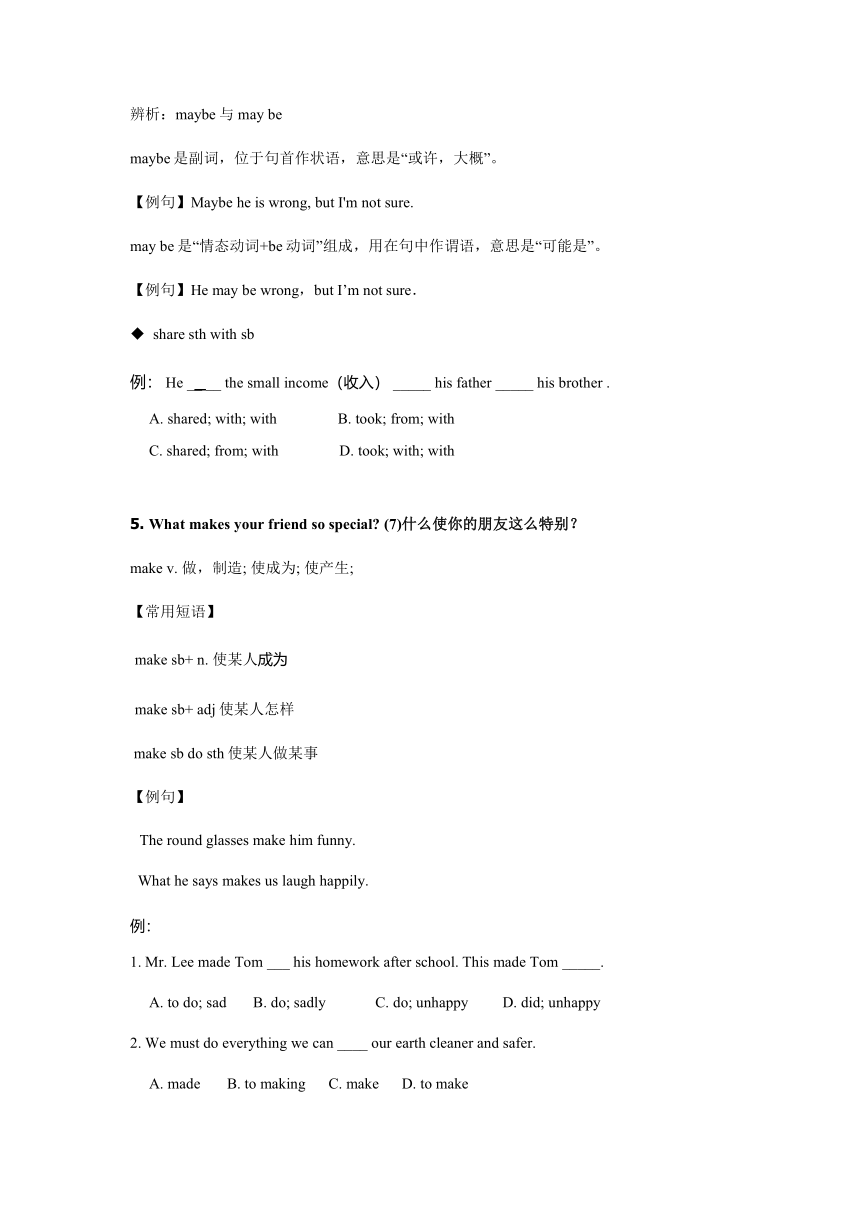
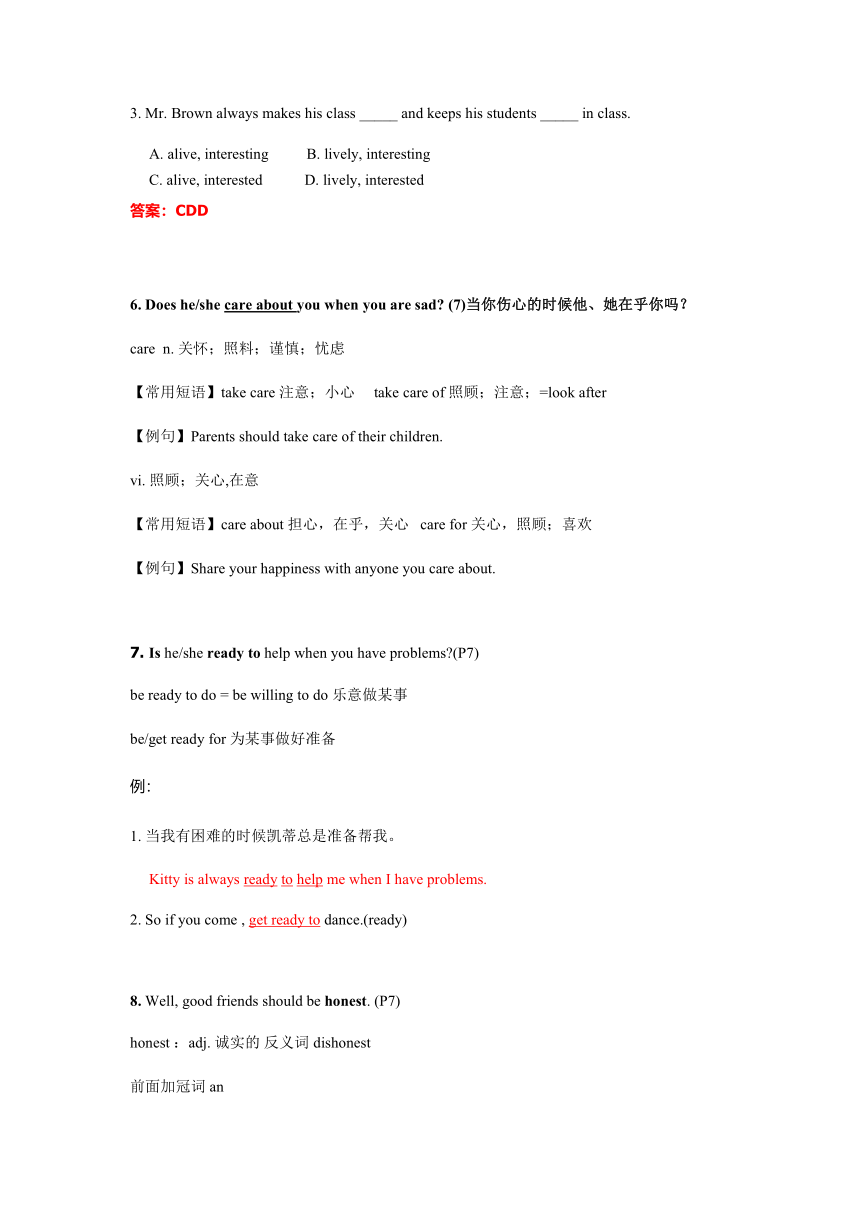
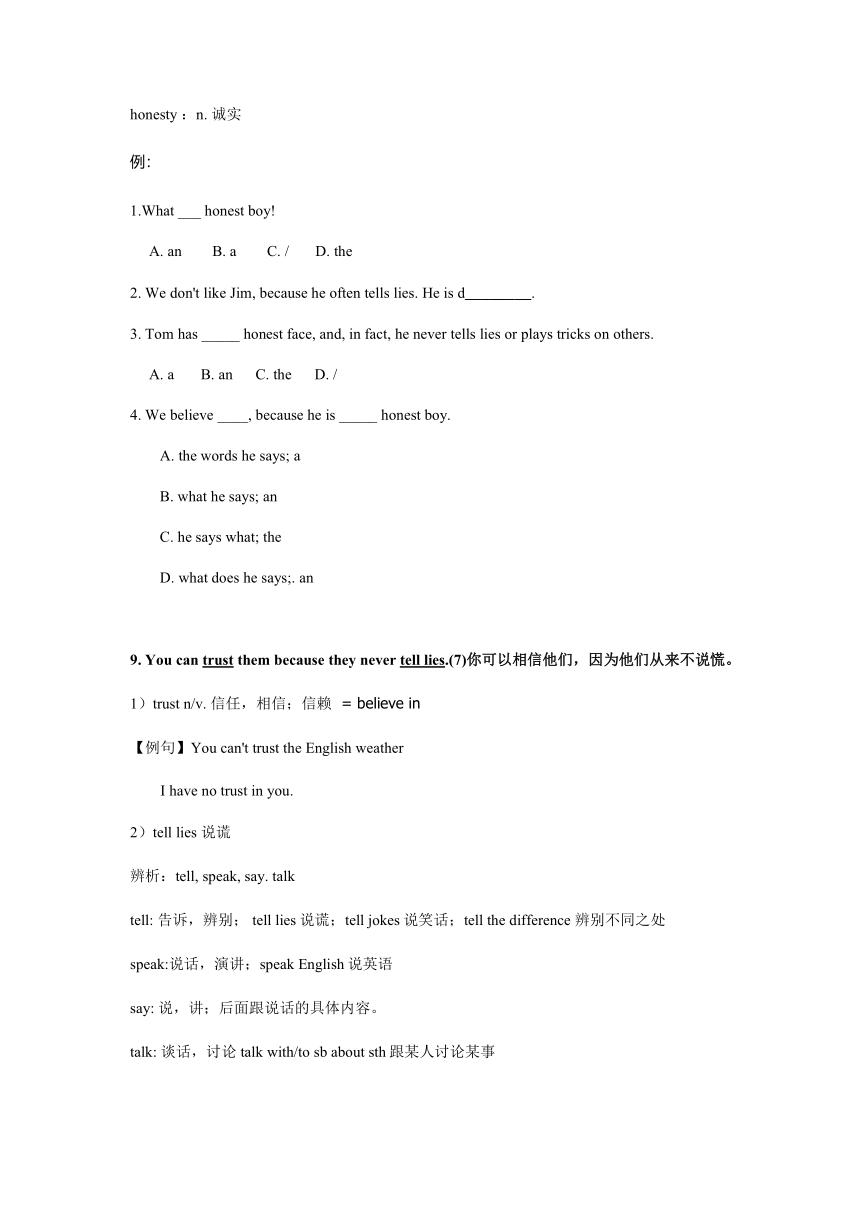
文档简介
牛津译林8AUnit1知识梳理
知识点一
Comic
-
Reading知识梳理
【知识梳理】
1.
Do
you
want
some?
(P6)
Can
I
have
something
to
drink?
(P6)
some/something
为不定代词,一般用于肯定句中,变为否定句时要将some/something改为any/anything。
但some/something
亦可用于表达请求、建议或希望得到对方肯定回答的一般疑问句中。
any也同样可以用于肯定句中,表示“任何”的含义。
例:
1)---
Is
there
____
in
today's
newspaper?
---
Yes,
there
is.
A.
something
interesting
B.
interesting
something
C.
anything
interesting
D.
interesting
anything
2)
I
think
______
can
make
Andy
change
his
mind.
He
is
such
a
person
who
never
gives
up
easily.
A.
something
B.
anything
C.
nothing
D.
everything
3.)---The
story
is
amazing!
It's
the
most
interesting
story
I've
ever
read.
---
But
I'm
afraid
it
won't
be
liked
by
______.
A.
somebody
B.
everybody
C.
anybody
D.
nobody.
4)
---The
story
is
terrible!
It's
the
most
disgusting(恶心的)
story
I've
ever
read.
---
I
agree
with
you.
It
won't
be
liked
by
_____.
A.
somebody
B.
everybody
C.
anybody
D.
nobody
答案:CCBC
2.
Can
I
have
some
more
food?我能吃更多食物吗?(P6)
More:
更多,much,many的比较级形式。
数词+
more+可数名词
=
another+数词+可数名词
【例句】The
chairs
are
not
enough.
We
need
two
more
chairs.=We
need
another
two
chairs.
3.
There's
nothing
in
the
fridge.
(P6)
nothing
为不定代词,表否定。
nothing
=
not
anything
不定代词的修饰词要放在不定代词之后,即:something/anything/nothing
+adj.
e.
g.
something
important/
anything
else/
nothing
interesting/
something
to
drink/
例:
2)
—
Can
I
have
____?
—
Of
course
you
can.
Here
you
are
A.
anything
eat
B.
something
eating
C.
anything
to
eat
D.
something
to
eat
3)别无选择,只有等待救援到来了。
There
was
no
choice
but
wait
till
help
came.
4)她打开盒子,发现空空如也。
She
opened
the
box
and
found
nothing.
4.
Maybe
we
can
share
it.或许我们可以分享它。(6)
◆Maybe
adv.大概,或许
辨析:maybe与may
be
maybe是副词,位于句首作状语,意思是“或许,大概”。
【例句】Maybe
he
is
wrong,
but
I'm
not
sure.
may
be是“情态动词+be动词”组成,用在句中作谓语,意思是“可能是”。
【例句】He
may
be
wrong,but
I’m
not
sure.
◆
share
sth
with
sb
例:
He
__
__
the
small
income(收入)
_____
his
father
_____
his
brother
.
A.
shared;
with;
with
B.
took;
from;
with
C.
shared;
from;
with
D.
took;
with;
with
5.
What
makes
your
friend
so
special?
(7)什么使你的朋友这么特别?
make
v.
做,制造;
使成为;
使产生;
【常用短语】
make
sb+
n.
使某人成为
make
sb+
adj使某人怎样
make
sb
do
sth使某人做某事
【例句】
The
round
glasses
make
him
funny.
What
he
says
makes
us
laugh
happily.
例:
1.
Mr.
Lee
made
Tom
___
his
homework
after
school.
This
made
Tom
_____.
A.
to
do;
sad
B.
do;
sadly
C.
do;
unhappy
D.
did;
unhappy
2.
We
must
do
everything
we
can
____
our
earth
cleaner
and
safer.
A.
made
B.
to
making
C.
make
D.
to
make
3.
Mr.
Brown
always
makes
his
class
_____
and
keeps
his
students
_____
in
class.
A.
alive,
interesting
B.
lively,
interesting
C.
alive,
interested
D.
lively,
interested
答案:CDD
6.
Does
he/she
care
about
you
when
you
are
sad?
(7)当你伤心的时候他、她在乎你吗?
care
n.
关怀;照料;谨慎;忧虑
【常用短语】take
care
注意;小心
take
care
of
照顾;注意;=look
after
【例句】Parents
should
take
care
of
their
children.
vi.
照顾;关心,在意
【常用短语】care
about
担心,在乎,关心
care
for
关心,照顾;喜欢
【例句】Share
your
happiness
with
anyone
you
care
about.
7.
Is
he/she
ready
to
help
when
you
have
problems?(P7)
be
ready
to
do
=
be
willing
to
do
乐意做某事
be/get
ready
for
为某事做好准备
例:
1.
当我有困难的时候凯蒂总是准备帮我。
Kitty
is
always
ready
to
help
me
when
I
have
problems.
2.
So
if
you
come
,
get
ready
to
dance.(ready)
8.
Well,
good
friends
should
be
honest.
(P7)
honest
:adj.
诚实的
反义词
dishonest
前面加冠词an
honesty
:n.
诚实
例:
1.What
___
honest
boy!
A.
an
B.
a
C.
/
D.
the
2.
We
don't
like
Jim,
because
he
often
tells
lies.
He
is
d________.
3.
Tom
has
_____
honest
face,
and,
in
fact,
he
never
tells
lies
or
plays
tricks
on
others.
A.
a
B.
an
C.
the
D.
/
4.
We
believe
____,
because
he
is
_____
honest
boy.
A.
the
words
he
says;
a
B.
what
he
says;
an
C.
he
says
what;
the
D.
what
does
he
says;.
an
9.
You
can
trust
them
because
they
never
tell
lies.(7)你可以相信他们,因为他们从来不说慌。
1)trust
n/v.
信任,相信;信赖
=
believe
in
【例句】You
can't
trust
the
English
weather
I
have
no
trust
in
you.
tell
lies
说谎
辨析:tell,
speak,
say.
talk
tell:
告诉,辨别;
tell
lies说谎;tell
jokes说笑话;tell
the
difference
辨别不同之处
speak:说话,演讲;speak
English说英语
say:
说,讲;后面跟说话的具体内容。
talk:
谈话,讨论talk
with/to
sb
about
sth跟某人讨论某事
10.
polite
(P7)
adj.
有礼貌的,文雅的,客气的,
上流的
e.
g.
Jim
is
a
very
quiet
and
polite
person.
吉姆是一个非常安静而礼貌的人。
adv.
politely
反义词:impolite
adj.
无礼的,粗鲁的,不客气的
例:
1.
It
is
very
_______
of
you
to
stare
at
a
girl's
face.
(polite)
2.
Another
thing
you
should
do
is
to
_______
tell
them
what
to
do
next.
(polite)
3.
Please
make
clear
that
he
should
never
act
so
_______
again.
(polite)
11.
Betty
is
one
of
my
best
friends.
(P8)
one
of的用法
1)one
of
后接名词复数,常见题型:词汇题
e.g.
one
of
the
students
2)one
of
后接形容词最高级,常见于词汇题
e.g.
黄河是世界上最长的河流之一。
The
Yellow
River
is
one
of
the
longest
rivers
in
the
world.
3)注意one
of句型中的谓语动词要用单数形式
e.g.
他们中有学生来自澳大利亚。
One
of
the
students
comes
from
Australia.
例:
1.
Amy
is
one
of
the
best
_________
(swim)
at
the
school.
2.
This
bag
is
one
of
those
________.(visit)
3.
I
think
Shanghai
is
one
of
________
(modern)
cities
in
the
world.
(the
most
modern)
4.
我觉得中国是世界市场上最活跃的国家之一。
I
think
China
is
one
of
the
most
active
countries
in
the
international
market.
12.
She
helps
me
with
my
homework.
(P8)
1)
帮助别人做某事:help
sb
(to)
do/help
sb
with
注意:to可以省略,另外,如果后面接名词,应该用with连接,属于易错句型结构。
e.g.
玛丽经常帮妈妈做家务。
Mary
often
helps
her
mother
to
do
housework.
Mary
often
helps
her
mother
with
housework.
2)
can't
help
doing
情不自禁地做某事
e.g.
当他看到这些漂亮的烟花时,情不自禁地拍了照片。
He
couldn't
help
taking
photos
when
he
saw
the
beautiful
fireworks.
例:
1.
She
is
also
very
helpful
and
is
ready
to
help
(help)
people
any
time.
2.
I
would
like
to
help
people
solve
(solve)
problems.
3.
I
try
my
best
to
help
(help)
them.
4.
---What
is
he
like?
---He
is
helpful.
(help)
5.
当你有困难时,可以向怀特先生求助。
You
can
ask
Mr.
White
for
help
when
you
are
in
trouble.
13.
Betty
has
a
good
voice.(P8)
◆sound、voice、noise辨析
1)
sound作“声音”,“响声”讲时,可以指人或动物发出的声音,或物体碰撞的声言。这个词的使用范围很大。可以说,大自然的任何“声音”都可以用sound。
e.g.
光的传播比声音快得多。
Light
travels
much
faster
than
sound.
2)
noise意为“噪音”、“喧闹声”,常指不悦耳、不和谐的嘈杂声。
e.g.
车辆的喧闹声让他睡不着。
The
noise
of
traffic
made
him
awake.
3)
voice一般指人的声音,说话、唱歌。谈笑都可用voice。sound和noise不仅能指人的声音,还可以表示别的动物发出的声音;而voice除了有时可指鸟的声音外,很少表示其它动物的声音。注意:voice本身不可数,但表示几种声音时可数。
e.g.
中国好声音
Voice
of
China
美国之音
Voice
of
America
那个女孩嗓音很美
The
girl
has
a
beautiful
voice
4)
sound作系动词,“听起来”,后面接形容词
e.g.
这段音乐倍儿好听!
How
nice
the
piece
of
music
sounds!
例:
用sound,
noise,
voice,
sound
like
填空:
1.
Don't
make
any
noise,
children.
2.
There
is
so
much
noise
in
this
room
that
I
can't
hear
you
talking.
3.
They
were
shouting
at
the
top
of
their
voices.
4.
This
sentence
sounds
strange?
5.
I
can
hear
the
sound
of
the
bells
outside.
14.
He
wears
small,
round
glasses.
(P8)
◆
wear、put
on、dress、in、on辨析
1)
wear:“穿着,戴着”,表示“状态”;脸上挂着...表情
e.g.
She
is
wearing
a
pair
of
glass.
She
always
wears
a
smile
on
her
face.
2)
put
on:“穿上,戴上”,强调动作,后接衣服、鞋帽等
e.g.
穿上你的大衣吧,不然你会感冒的
Put
on
your
coat
or
you
will
catch
a
cold.
注意:put
on的反义词为“take
off”,而不是“put
off”
3)
dress:作动词,“给...穿衣服”dress
sb
“给自己穿衣服”dress
oneself
/
get
dressed
e.g.
杰克足够大了,可以给自己穿衣服了。
Jack
is
old
enough
to
dress
himself.
4)
in+颜色,表示穿着某个颜色衣服
e.g.
穿红衣的女孩
the
girl
in
red
5)
on+某人,表示衣服穿在某人身上
e.g.
你穿这条粉色裙子,真真儿是美呆了!
You
look
wonderful
on
this
pink
dress.
例:
1.
---Was
Kate
at
the
party
last
night?
---Yes,
she
____B____
a
really
nice
dress.
A.
is
wearing
B.
was
wearing
C.
would
wear
D.
has
worn
2.
According
to
the
new
traffic
law,
everyone
in
a
car
must
wear
the
seat
belt.
(穿戴)
3.
---Allen,
your
bedroom
is
in
a
mess.
---Sorry,
Mum.
I'll
___B___
my
things
at
once.
A.
put
on
B.
put
away
C.
put
out
D.
put
up
4.
You'd
better
_____C______
your
coat.
It's
too
hot
here.
A.
put
on
B.
put
off
C.
take
off
D.
put
out
15.
Max
has
a
good
sense
of
humor.(8)麦克斯很有幽默感。
1)sense
n.
感觉,官能;观念;
v.
感觉到,觉察到
常见短语:
sense
of
direction
方向感
common
senses常识
make
sense
有道理;合乎情理
come
to
one's
senses
苏醒过来
humor
n.
幽默
humorous
adj.
幽默的
【例句】
She
loved
everything
about
him,especially
his
humor.
What
a
humorous
story!
16.
I
never
feel
bored
with
him.(8)跟他在一起我从来不觉得无聊。
bore
v
.
使厌烦
bored
adj.
无聊的(用于修饰某人的心情
,常见搭配
feel/be
bored
with对...感到厌倦)
boring
adj.
无聊的(用于修饰某件事或者某个事情)
【例句】
His
speech
bored
us.
I
never
feel
bored
when
he
is
with
me.
I
don’t
want
to
do
the
boring
job.
17.
They
do
not
fit
well
under
his
desk.
(P8)
fit、match、suit辨析
1)
fit:大小合适
2)
match:与...相配或相称
3)
suit:花色、款式,风格等与皮肤、气质、身材或身份相称
例:
从fit、match、suit挑出合适的词
1)
Try
the
new
key
and
see
if
it
fits
the
keyhole(钥匙孔)
2)Carpets
should
match
the
curtains.
3)
Does
the
coat
suit
you?
4)
这条新裙子她穿着真漂亮。
This
new
dress
suits
her
beautifully.
5)
这条裤子太小,不适合你穿。
These
pair
of
trousers
are
too
small
to
fit
you.
18.
He
often
knocks
our
books
and
pens
onto
the
floor.
(P8)
knock
为中心的短语
◆敲
knock
on/
at
◆碰掉
knock
sth.
off
sth.
◆撞倒
knock
sb.
down
◆打翻
knock
over
sth.
◆撞到
knock
onto
例:
1.
Max把我的玻璃杯从桌上碰掉了。
Max
knocked
my
glass
off
the
table.
2.
你把我的饮料打翻到地上了。
You
knocked
over
my
drink
onto
the
floor.
A
car
knocked
him
off
his
bike
yesterday
onto
the
ground.
19.
She
smiles
often
and
never
says
a
bad
word
about
anyone.
(8)她经常微笑,从来不说别人的坏话。
smile
v.
微笑
,
常用短语
smile
at
朝...微笑
n.
微笑,笑容
常用短语
wear
a
big
smile面带微笑
smiling
adj.微笑的
【例句】
He
smiled
at
me
and
then
asked
me
if
he
could
sit
near
me.
The
smile
on
her
face
warms
me.
知识点二
Grammar
【知识梳理】
1.
形容词比较级和最高级的构成方法
大多数形容词有三个等级:①原级,即原形:②比较级.表示“较……”或“更……一些”的意思;③最高级,表示“最……”的意思。
◆形容词比较级和最高级的构成方法:
情况
构成方式
原级
比较级
最高级
一般情况
加-er或-est
new
long
newer
longer
newest
longest
以e
结尾的词
加-r或-st
fine
late
finer
later
finest
latest
以“辅音+y”
结尾的词
变y为i再加-er或-est
early
happy
earlier
happier
earliest
happiest
重读闭音节的词末尾只有一个辅音字母
先双写辅音字母,再加-er或-est
hot
thin
fat
hotter
thinner
fatter
hottest
thinnest
fattest
多音节词和部分双音节词
在其前面加more或
most
?useful?????????????????????????????
?more
useful?
?most
useful
◆在初中阶段,需要双写末尾字母的单词有:在一个炎热的夏天,有一个大胖子想要减肥变瘦变苗条,但是他失败了,所以他很伤心。(hot,big,
fat,slim,
thin,sad
)
◆不规则变化
原
级
比
较
级
最
高
级
good(好的)adj
well(健康的)adv
better
best
bad(坏的)
ill(有病的)
worse
worst
old(老的)
older/
elder
oldest
/
eldest
much/many(多的)
more
most
little(少的)
less
least
far(远的)
farther/
further
farthest
/
furthest
写出以下各形容词的比较级和最高级:
1.?nice?_________???2.?fat?_________??3.?slow?_________??4.?dry?_________
5.?happy?_________??6.?wet?_________?7.?much?_________??8.?ill_________
9.?little?_________??10.?bad?_________11.?thin?_________12.?far?_________
13.?early?_________?14.?careful________??15.?exciting_______16.well______
17.?green_________?18.?few________?19.busy_______
答案:1.nicer,
nicest
2.fatter,
fattest
3.slower,
slowest
4.drier,
driest
5.
happier,
happiest
6.wetter,
wettest
7.more,most
8.worse,
worst
9.less,
least
10.worse,
worst
11.thinner,
thinnest
12.farther/further,
farthest/furthest
13.
earlier,
earliest
14.more
careful,
the
most
careful
15.more
exciting,
the
most
exciting
16.better,
best
17.
greener,
greenest
18.fewer,
fewest
19.
busier,
busiest
2.
形容词副词比较级的用法
1)形容词比较级用于两个人或事物的比较。表示在两者中间一方比另一方“更加…”。连词than后可接句子,也可接名词、代词、名词短语、介词短语、.动词、动词不定式.ing结构和ed结构。
如:Our
teacher
is
taller
than
us.
我们老师的个子比我们的高。
◆than前后两项相比较的人或事物要一致。
如:It
is
warmer
today
than
it
was
yesterday.
今天的天气比昨天暖和。
The
clothes
in
this
shop
are
more
expensive
than
those
in
that
shop.
这家店里的衣服比那家店(里的衣服)贵。
Judy’s
hair
is
longer
than
Lily’s.
朱迪的头发比莉莉(的)长。
2)形容词前如加
less
和
least
则表示"较不"和"最不"
。
如:important
重要
less
important
较不重要
least
important
最不重要
This
room
is
less
beautiful
than
that
one.
3)一方随另一方的程度而变化时用the+比较级…the+比较级…。表示“越...
就越...”。
如:The
more
you
study,
the
more
you
know.
你学的越多,
就知道的越多。
The
more,
the
better.
越多越好。
The
harder
he
works,
the
happier
he
feels.
工作越努力,感觉越充实。
4)本身程度发生改变时用"形容词比较级
+
and
+
同一个形容词比较级"。表示
"
越来越...
"。
如:It's
getting
hotter
and
hotter.
天气越来越热了。
The
girl
becomes
more
and
more
beautiful.那姑娘长得越来越漂亮了。
5)比较级前可用a
little,
a
bit,
a
lot,
far,
much,
even等词语表示超过另一方的程度。
如:This
book
is
far
more
expensive
than
that
one.
6)表示一方比另一方更…多少时,可以在比较级前加名词。
如:My
brother
is
two
years
older
than
me.
7)当两者比较,只出现一方,且句中含有of
the
two时,比较级前要加the,表示特指两者当中较。。。的一个。
如:He
is
the
taller
of
the
two
boys.他是两个男孩中较高的一个。
如:The
Yellow
River
is
the
second
longest
river
in
China.黄河是中国第二长河。
8)表示倍数:…times+形容词比较级+than…
如:我们的房间比他们的大二倍。
Our
room
is
twice
larger
than
theirs.
如:长江比你们城市的河长十倍。
The
Yangtze
River
is
ten
times
longer
than
the
river
in
your
city.
“比较级+
than
any
other
+单数名词”表示“比其他的任何……都……”
(同范围)
=
“比较级+
than
the
other
+复数名词”表示“比其他的任何……都……”
(同范围)
“比较级+
than
any
+单数名词”表示“比其他的任何……都……”
(不同范围)
(这个句型是用比较级形式表达最高级的意思。)
他在班里,比任何一个别的学生都好。
He
is
better
than
any
other
student
in
the
class.
=
He
is
better
than
the
other
students
in
the
class.
10)最高级的用法
◆one
of
the
+最高级,表示“是最……之一者”
上海是中国最美丽的城市之—。
Shanghai
is
one
of
the
most
beautiful
cities
in
China.
注意:one
of
the
+最高级,后面要加上名词的复数,即为”one
of
the
+最高级+复数名词”
◆most+复数名词、most
of
the+复数名词)或most
of+代词,表示“大多数,大部分的……”
他的大部分书是在这儿写的。
Most
of
his
books
were
written
here.
◆序数词加形容词最高级
序数词加形容词最高级表“第几最…”
黄河是中国第二长河。
The
Yellow
River
is
the
second
longest
river
in
China.
11)原级和比较级的相互转化
e.g.
1)
I'm
not
as
tall
as
he
is.=
I'm
shorter
than
he
is.
2)
Nanjing
is
not
as
big
as
Shanghai.
=
Nanjing
is
smaller
than
Shanghai.
=
Shanghai
is
bigger
than
Nanjing.
3)
Diving
isn't
as
interesting
as
swimming.
=
Diving
is
less
interesting
than
swimming.
=
Swimming
is
more
interesting
than
diving.
知识点三
Integrated
skills
and
Task
【知识梳理】
1、make
friends
交朋友(13)
【常用短语】make
friends
with
sb
跟某人交朋友
【例句】
I’d
like
to
meet
lots
of
people
and
make
friends
with
them.
2、I
would
like
to
be
a
social
worker
when
I
grow
up.我长大后想当一名社会工作者。
1)would
like的用法
would
like的意思是“想;想要”,相当于want,但语气比want委婉,常用于以下三种结构:
would
like
sth.想要某物,相当于want
sth.。
I
would
like
a
pair
of
shoes.
=
I
want
a
pair
of
shoes.我想要双鞋。
would
like
to
do
sth.想要做某事,相当于want
to
do
sth.。
I
would
like
to
buy
a
CD.
=
I
want
to
buy
a
CD.我想买张光盘。
would
like
sb.
to
do
sth.想要某人做某事,相当于want
sb.
to
do
sth.。
I
would
like
you
to
help
me
with
my
English.
=I
want
you
to
help
me
with
my
English.
我想要你帮我学英语。:
用所给单词的适当形式填空
①I
would
like
you
________
(meet)a
friend
of
mine.
②We
would
like
________
(visit)
that
museum.
答案::
to
meet;
to
visit
social
worker社会工作者
social
adj.
社会的,社交的,群居的
society
n.
社会,社团
例:
1.It
is
a
social
(society)
work
to
take
good
care
of
the
elderly.
2.In
today's
society
(social),male
and
female
have
the
equal
rights
to
work.
3、----What’s
she
like?
----She’s
shy
and
quiet.
(14)她什么样?她害羞而安静。
辨析:
What’s
she
like?
她怎样?询问某人的性格或者长相。
What
does
she
like?她喜欢什么?询问的是某人的爱好。
What
does
she
look
like?她看起来怎样?询问的是某人的长相。
【例题】----_________?
----He
is
humorous.
A.
How
is
he
B.
What
does
he
look
like
C.
What
does
he
like
D.
What
is
he
like
4、She’s
a
small
girl
with
a
ponytail.(14)她是一个扎着马尾辫的小女孩。
with
prep.
伴随,有着
【例句】
Fish
sleep
with
eyes
open.
Teacher
Wang
comes
in
with
a
book
in
his
arm.
Mike
can’t
find
his
key,
so
he
opens
the
door
with
a
knife.
5.
Kate
is
both
my
neighbor
and
my
best
friend.(P17)
both,
either,
neither的区别和用法
使用范围:两个人或物
both
(两者都;谓语动词-复数)
either(两者中任何一个;谓语动词-单数)
neither
(两者都不;谓语动词-单数)
e.g.
两个男孩都不聪明
Neither
of
the
two
students
is
clever. 。
两个男孩都很聪明。
Both
the
students
are
clever.
两个男孩中有一个很聪明。
Either
of
the
two
students
is
clever.
例:
1)
There
are
flowers
on
either
side
(side)
of
the
bank.
2)
Which
would
you
like
better
for
breakfast?
Bread
or
cake?
Oh,
I
like
__B__.
I
just
want
some
noodles.
A.
both
B.
neither
C.
either
D.
all
3)
---Wow!
You've
got
so
many
clothes.
---But
__D__
of
them
are
in
fashion
now.
A.
all
B.
both
C.
neither
D.
none
4)
---Excuse
me,
how
can
I
get
to
Nanshan
Mountain?
---Oh,
__A__
of
these
two
buses
will
take
you
there.
You
must
go
and
take
No.3
bus.
A.
neither
B.
all
C.
none
D.
both
6.
She
always
has
a
smile
on
her
face
and
looks
happy.
(17)她总是面带微笑,看起来很开心。
(1)smile
n.微笑
面带微笑
have
a
smile
on
his
face/
with
a
smile
脸上的表情用介词on,如
have
a
happy
look
on
her
face
(2)smiling形容词(微笑的,带着笑意的)
【探究】smiling既可作表语,也可作定语。其中动词为smile,后可接介词at或to.
【例题】她对我微笑了,多好啊!She________
at
me.
How
wonderful!
他那双充满笑意的眼睛表明他很友好。His__________
eyes
show
he
is
very
friendly.
7.
patient形容词(耐心的)既可作定语,也可作表语;patient反义词为impatient(没有耐心的)
be
patient
with
sb./
sth.对某人/某事有耐心。
【拓展】patient还可作名词,意为“病人”,是可数名词。
【例题】她对孩子们很有耐心。She________
________
________
_________
the
children.
8.
Kate
is
both
my
neighbour
and
my
best
friends.凯特既是我的邻居又是我最好的朋友。
【探究】both...and意为“既......又......”,连接并列结构作主语时,谓语动词用复数。
【例题】______
Tom_____Peter
are
fond
of
watching
TV.
A.
Not
only;
but
also
B.
Both;
and
C.
Either;
or
D.
Neither;
nor
知识点一
Comic
-
Reading知识梳理
【知识梳理】
1.
Do
you
want
some?
(P6)
Can
I
have
something
to
drink?
(P6)
some/something
为不定代词,一般用于肯定句中,变为否定句时要将some/something改为any/anything。
但some/something
亦可用于表达请求、建议或希望得到对方肯定回答的一般疑问句中。
any也同样可以用于肯定句中,表示“任何”的含义。
例:
1)---
Is
there
____
in
today's
newspaper?
---
Yes,
there
is.
A.
something
interesting
B.
interesting
something
C.
anything
interesting
D.
interesting
anything
2)
I
think
______
can
make
Andy
change
his
mind.
He
is
such
a
person
who
never
gives
up
easily.
A.
something
B.
anything
C.
nothing
D.
everything
3.)---The
story
is
amazing!
It's
the
most
interesting
story
I've
ever
read.
---
But
I'm
afraid
it
won't
be
liked
by
______.
A.
somebody
B.
everybody
C.
anybody
D.
nobody.
4)
---The
story
is
terrible!
It's
the
most
disgusting(恶心的)
story
I've
ever
read.
---
I
agree
with
you.
It
won't
be
liked
by
_____.
A.
somebody
B.
everybody
C.
anybody
D.
nobody
答案:CCBC
2.
Can
I
have
some
more
food?我能吃更多食物吗?(P6)
More:
更多,much,many的比较级形式。
数词+
more+可数名词
=
another+数词+可数名词
【例句】The
chairs
are
not
enough.
We
need
two
more
chairs.=We
need
another
two
chairs.
3.
There's
nothing
in
the
fridge.
(P6)
nothing
为不定代词,表否定。
nothing
=
not
anything
不定代词的修饰词要放在不定代词之后,即:something/anything/nothing
+adj.
e.
g.
something
important/
anything
else/
nothing
interesting/
something
to
drink/
例:
2)
—
Can
I
have
____?
—
Of
course
you
can.
Here
you
are
A.
anything
eat
B.
something
eating
C.
anything
to
eat
D.
something
to
eat
3)别无选择,只有等待救援到来了。
There
was
no
choice
but
wait
till
help
came.
4)她打开盒子,发现空空如也。
She
opened
the
box
and
found
nothing.
4.
Maybe
we
can
share
it.或许我们可以分享它。(6)
◆Maybe
adv.大概,或许
辨析:maybe与may
be
maybe是副词,位于句首作状语,意思是“或许,大概”。
【例句】Maybe
he
is
wrong,
but
I'm
not
sure.
may
be是“情态动词+be动词”组成,用在句中作谓语,意思是“可能是”。
【例句】He
may
be
wrong,but
I’m
not
sure.
◆
share
sth
with
sb
例:
He
__
__
the
small
income(收入)
_____
his
father
_____
his
brother
.
A.
shared;
with;
with
B.
took;
from;
with
C.
shared;
from;
with
D.
took;
with;
with
5.
What
makes
your
friend
so
special?
(7)什么使你的朋友这么特别?
make
v.
做,制造;
使成为;
使产生;
【常用短语】
make
sb+
n.
使某人成为
make
sb+
adj使某人怎样
make
sb
do
sth使某人做某事
【例句】
The
round
glasses
make
him
funny.
What
he
says
makes
us
laugh
happily.
例:
1.
Mr.
Lee
made
Tom
___
his
homework
after
school.
This
made
Tom
_____.
A.
to
do;
sad
B.
do;
sadly
C.
do;
unhappy
D.
did;
unhappy
2.
We
must
do
everything
we
can
____
our
earth
cleaner
and
safer.
A.
made
B.
to
making
C.
make
D.
to
make
3.
Mr.
Brown
always
makes
his
class
_____
and
keeps
his
students
_____
in
class.
A.
alive,
interesting
B.
lively,
interesting
C.
alive,
interested
D.
lively,
interested
答案:CDD
6.
Does
he/she
care
about
you
when
you
are
sad?
(7)当你伤心的时候他、她在乎你吗?
care
n.
关怀;照料;谨慎;忧虑
【常用短语】take
care
注意;小心
take
care
of
照顾;注意;=look
after
【例句】Parents
should
take
care
of
their
children.
vi.
照顾;关心,在意
【常用短语】care
about
担心,在乎,关心
care
for
关心,照顾;喜欢
【例句】Share
your
happiness
with
anyone
you
care
about.
7.
Is
he/she
ready
to
help
when
you
have
problems?(P7)
be
ready
to
do
=
be
willing
to
do
乐意做某事
be/get
ready
for
为某事做好准备
例:
1.
当我有困难的时候凯蒂总是准备帮我。
Kitty
is
always
ready
to
help
me
when
I
have
problems.
2.
So
if
you
come
,
get
ready
to
dance.(ready)
8.
Well,
good
friends
should
be
honest.
(P7)
honest
:adj.
诚实的
反义词
dishonest
前面加冠词an
honesty
:n.
诚实
例:
1.What
___
honest
boy!
A.
an
B.
a
C.
/
D.
the
2.
We
don't
like
Jim,
because
he
often
tells
lies.
He
is
d________.
3.
Tom
has
_____
honest
face,
and,
in
fact,
he
never
tells
lies
or
plays
tricks
on
others.
A.
a
B.
an
C.
the
D.
/
4.
We
believe
____,
because
he
is
_____
honest
boy.
A.
the
words
he
says;
a
B.
what
he
says;
an
C.
he
says
what;
the
D.
what
does
he
says;.
an
9.
You
can
trust
them
because
they
never
tell
lies.(7)你可以相信他们,因为他们从来不说慌。
1)trust
n/v.
信任,相信;信赖
=
believe
in
【例句】You
can't
trust
the
English
weather
I
have
no
trust
in
you.
tell
lies
说谎
辨析:tell,
speak,
say.
talk
tell:
告诉,辨别;
tell
lies说谎;tell
jokes说笑话;tell
the
difference
辨别不同之处
speak:说话,演讲;speak
English说英语
say:
说,讲;后面跟说话的具体内容。
talk:
谈话,讨论talk
with/to
sb
about
sth跟某人讨论某事
10.
polite
(P7)
adj.
有礼貌的,文雅的,客气的,
上流的
e.
g.
Jim
is
a
very
quiet
and
polite
person.
吉姆是一个非常安静而礼貌的人。
adv.
politely
反义词:impolite
adj.
无礼的,粗鲁的,不客气的
例:
1.
It
is
very
_______
of
you
to
stare
at
a
girl's
face.
(polite)
2.
Another
thing
you
should
do
is
to
_______
tell
them
what
to
do
next.
(polite)
3.
Please
make
clear
that
he
should
never
act
so
_______
again.
(polite)
11.
Betty
is
one
of
my
best
friends.
(P8)
one
of的用法
1)one
of
后接名词复数,常见题型:词汇题
e.g.
one
of
the
students
2)one
of
后接形容词最高级,常见于词汇题
e.g.
黄河是世界上最长的河流之一。
The
Yellow
River
is
one
of
the
longest
rivers
in
the
world.
3)注意one
of句型中的谓语动词要用单数形式
e.g.
他们中有学生来自澳大利亚。
One
of
the
students
comes
from
Australia.
例:
1.
Amy
is
one
of
the
best
_________
(swim)
at
the
school.
2.
This
bag
is
one
of
those
________.(visit)
3.
I
think
Shanghai
is
one
of
________
(modern)
cities
in
the
world.
(the
most
modern)
4.
我觉得中国是世界市场上最活跃的国家之一。
I
think
China
is
one
of
the
most
active
countries
in
the
international
market.
12.
She
helps
me
with
my
homework.
(P8)
1)
帮助别人做某事:help
sb
(to)
do/help
sb
with
注意:to可以省略,另外,如果后面接名词,应该用with连接,属于易错句型结构。
e.g.
玛丽经常帮妈妈做家务。
Mary
often
helps
her
mother
to
do
housework.
Mary
often
helps
her
mother
with
housework.
2)
can't
help
doing
情不自禁地做某事
e.g.
当他看到这些漂亮的烟花时,情不自禁地拍了照片。
He
couldn't
help
taking
photos
when
he
saw
the
beautiful
fireworks.
例:
1.
She
is
also
very
helpful
and
is
ready
to
help
(help)
people
any
time.
2.
I
would
like
to
help
people
solve
(solve)
problems.
3.
I
try
my
best
to
help
(help)
them.
4.
---What
is
he
like?
---He
is
helpful.
(help)
5.
当你有困难时,可以向怀特先生求助。
You
can
ask
Mr.
White
for
help
when
you
are
in
trouble.
13.
Betty
has
a
good
voice.(P8)
◆sound、voice、noise辨析
1)
sound作“声音”,“响声”讲时,可以指人或动物发出的声音,或物体碰撞的声言。这个词的使用范围很大。可以说,大自然的任何“声音”都可以用sound。
e.g.
光的传播比声音快得多。
Light
travels
much
faster
than
sound.
2)
noise意为“噪音”、“喧闹声”,常指不悦耳、不和谐的嘈杂声。
e.g.
车辆的喧闹声让他睡不着。
The
noise
of
traffic
made
him
awake.
3)
voice一般指人的声音,说话、唱歌。谈笑都可用voice。sound和noise不仅能指人的声音,还可以表示别的动物发出的声音;而voice除了有时可指鸟的声音外,很少表示其它动物的声音。注意:voice本身不可数,但表示几种声音时可数。
e.g.
中国好声音
Voice
of
China
美国之音
Voice
of
America
那个女孩嗓音很美
The
girl
has
a
beautiful
voice
4)
sound作系动词,“听起来”,后面接形容词
e.g.
这段音乐倍儿好听!
How
nice
the
piece
of
music
sounds!
例:
用sound,
noise,
voice,
sound
like
填空:
1.
Don't
make
any
noise,
children.
2.
There
is
so
much
noise
in
this
room
that
I
can't
hear
you
talking.
3.
They
were
shouting
at
the
top
of
their
voices.
4.
This
sentence
sounds
strange?
5.
I
can
hear
the
sound
of
the
bells
outside.
14.
He
wears
small,
round
glasses.
(P8)
◆
wear、put
on、dress、in、on辨析
1)
wear:“穿着,戴着”,表示“状态”;脸上挂着...表情
e.g.
She
is
wearing
a
pair
of
glass.
She
always
wears
a
smile
on
her
face.
2)
put
on:“穿上,戴上”,强调动作,后接衣服、鞋帽等
e.g.
穿上你的大衣吧,不然你会感冒的
Put
on
your
coat
or
you
will
catch
a
cold.
注意:put
on的反义词为“take
off”,而不是“put
off”
3)
dress:作动词,“给...穿衣服”dress
sb
“给自己穿衣服”dress
oneself
/
get
dressed
e.g.
杰克足够大了,可以给自己穿衣服了。
Jack
is
old
enough
to
dress
himself.
4)
in+颜色,表示穿着某个颜色衣服
e.g.
穿红衣的女孩
the
girl
in
red
5)
on+某人,表示衣服穿在某人身上
e.g.
你穿这条粉色裙子,真真儿是美呆了!
You
look
wonderful
on
this
pink
dress.
例:
1.
---Was
Kate
at
the
party
last
night?
---Yes,
she
____B____
a
really
nice
dress.
A.
is
wearing
B.
was
wearing
C.
would
wear
D.
has
worn
2.
According
to
the
new
traffic
law,
everyone
in
a
car
must
wear
the
seat
belt.
(穿戴)
3.
---Allen,
your
bedroom
is
in
a
mess.
---Sorry,
Mum.
I'll
___B___
my
things
at
once.
A.
put
on
B.
put
away
C.
put
out
D.
put
up
4.
You'd
better
_____C______
your
coat.
It's
too
hot
here.
A.
put
on
B.
put
off
C.
take
off
D.
put
out
15.
Max
has
a
good
sense
of
humor.(8)麦克斯很有幽默感。
1)sense
n.
感觉,官能;观念;
v.
感觉到,觉察到
常见短语:
sense
of
direction
方向感
common
senses常识
make
sense
有道理;合乎情理
come
to
one's
senses
苏醒过来
humor
n.
幽默
humorous
adj.
幽默的
【例句】
She
loved
everything
about
him,especially
his
humor.
What
a
humorous
story!
16.
I
never
feel
bored
with
him.(8)跟他在一起我从来不觉得无聊。
bore
v
.
使厌烦
bored
adj.
无聊的(用于修饰某人的心情
,常见搭配
feel/be
bored
with对...感到厌倦)
boring
adj.
无聊的(用于修饰某件事或者某个事情)
【例句】
His
speech
bored
us.
I
never
feel
bored
when
he
is
with
me.
I
don’t
want
to
do
the
boring
job.
17.
They
do
not
fit
well
under
his
desk.
(P8)
fit、match、suit辨析
1)
fit:大小合适
2)
match:与...相配或相称
3)
suit:花色、款式,风格等与皮肤、气质、身材或身份相称
例:
从fit、match、suit挑出合适的词
1)
Try
the
new
key
and
see
if
it
fits
the
keyhole(钥匙孔)
2)Carpets
should
match
the
curtains.
3)
Does
the
coat
suit
you?
4)
这条新裙子她穿着真漂亮。
This
new
dress
suits
her
beautifully.
5)
这条裤子太小,不适合你穿。
These
pair
of
trousers
are
too
small
to
fit
you.
18.
He
often
knocks
our
books
and
pens
onto
the
floor.
(P8)
knock
为中心的短语
◆敲
knock
on/
at
◆碰掉
knock
sth.
off
sth.
◆撞倒
knock
sb.
down
◆打翻
knock
over
sth.
◆撞到
knock
onto
例:
1.
Max把我的玻璃杯从桌上碰掉了。
Max
knocked
my
glass
off
the
table.
2.
你把我的饮料打翻到地上了。
You
knocked
over
my
drink
onto
the
floor.
A
car
knocked
him
off
his
bike
yesterday
onto
the
ground.
19.
She
smiles
often
and
never
says
a
bad
word
about
anyone.
(8)她经常微笑,从来不说别人的坏话。
smile
v.
微笑
,
常用短语
smile
at
朝...微笑
n.
微笑,笑容
常用短语
wear
a
big
smile面带微笑
smiling
adj.微笑的
【例句】
He
smiled
at
me
and
then
asked
me
if
he
could
sit
near
me.
The
smile
on
her
face
warms
me.
知识点二
Grammar
【知识梳理】
1.
形容词比较级和最高级的构成方法
大多数形容词有三个等级:①原级,即原形:②比较级.表示“较……”或“更……一些”的意思;③最高级,表示“最……”的意思。
◆形容词比较级和最高级的构成方法:
情况
构成方式
原级
比较级
最高级
一般情况
加-er或-est
new
long
newer
longer
newest
longest
以e
结尾的词
加-r或-st
fine
late
finer
later
finest
latest
以“辅音+y”
结尾的词
变y为i再加-er或-est
early
happy
earlier
happier
earliest
happiest
重读闭音节的词末尾只有一个辅音字母
先双写辅音字母,再加-er或-est
hot
thin
fat
hotter
thinner
fatter
hottest
thinnest
fattest
多音节词和部分双音节词
在其前面加more或
most
?useful?????????????????????????????
?more
useful?
?most
useful
◆在初中阶段,需要双写末尾字母的单词有:在一个炎热的夏天,有一个大胖子想要减肥变瘦变苗条,但是他失败了,所以他很伤心。(hot,big,
fat,slim,
thin,sad
)
◆不规则变化
原
级
比
较
级
最
高
级
good(好的)adj
well(健康的)adv
better
best
bad(坏的)
ill(有病的)
worse
worst
old(老的)
older/
elder
oldest
/
eldest
much/many(多的)
more
most
little(少的)
less
least
far(远的)
farther/
further
farthest
/
furthest
写出以下各形容词的比较级和最高级:
1.?nice?_________???2.?fat?_________??3.?slow?_________??4.?dry?_________
5.?happy?_________??6.?wet?_________?7.?much?_________??8.?ill_________
9.?little?_________??10.?bad?_________11.?thin?_________12.?far?_________
13.?early?_________?14.?careful________??15.?exciting_______16.well______
17.?green_________?18.?few________?19.busy_______
答案:1.nicer,
nicest
2.fatter,
fattest
3.slower,
slowest
4.drier,
driest
5.
happier,
happiest
6.wetter,
wettest
7.more,most
8.worse,
worst
9.less,
least
10.worse,
worst
11.thinner,
thinnest
12.farther/further,
farthest/furthest
13.
earlier,
earliest
14.more
careful,
the
most
careful
15.more
exciting,
the
most
exciting
16.better,
best
17.
greener,
greenest
18.fewer,
fewest
19.
busier,
busiest
2.
形容词副词比较级的用法
1)形容词比较级用于两个人或事物的比较。表示在两者中间一方比另一方“更加…”。连词than后可接句子,也可接名词、代词、名词短语、介词短语、.动词、动词不定式.ing结构和ed结构。
如:Our
teacher
is
taller
than
us.
我们老师的个子比我们的高。
◆than前后两项相比较的人或事物要一致。
如:It
is
warmer
today
than
it
was
yesterday.
今天的天气比昨天暖和。
The
clothes
in
this
shop
are
more
expensive
than
those
in
that
shop.
这家店里的衣服比那家店(里的衣服)贵。
Judy’s
hair
is
longer
than
Lily’s.
朱迪的头发比莉莉(的)长。
2)形容词前如加
less
和
least
则表示"较不"和"最不"
。
如:important
重要
less
important
较不重要
least
important
最不重要
This
room
is
less
beautiful
than
that
one.
3)一方随另一方的程度而变化时用the+比较级…the+比较级…。表示“越...
就越...”。
如:The
more
you
study,
the
more
you
know.
你学的越多,
就知道的越多。
The
more,
the
better.
越多越好。
The
harder
he
works,
the
happier
he
feels.
工作越努力,感觉越充实。
4)本身程度发生改变时用"形容词比较级
+
and
+
同一个形容词比较级"。表示
"
越来越...
"。
如:It's
getting
hotter
and
hotter.
天气越来越热了。
The
girl
becomes
more
and
more
beautiful.那姑娘长得越来越漂亮了。
5)比较级前可用a
little,
a
bit,
a
lot,
far,
much,
even等词语表示超过另一方的程度。
如:This
book
is
far
more
expensive
than
that
one.
6)表示一方比另一方更…多少时,可以在比较级前加名词。
如:My
brother
is
two
years
older
than
me.
7)当两者比较,只出现一方,且句中含有of
the
two时,比较级前要加the,表示特指两者当中较。。。的一个。
如:He
is
the
taller
of
the
two
boys.他是两个男孩中较高的一个。
如:The
Yellow
River
is
the
second
longest
river
in
China.黄河是中国第二长河。
8)表示倍数:…times+形容词比较级+than…
如:我们的房间比他们的大二倍。
Our
room
is
twice
larger
than
theirs.
如:长江比你们城市的河长十倍。
The
Yangtze
River
is
ten
times
longer
than
the
river
in
your
city.
“比较级+
than
any
other
+单数名词”表示“比其他的任何……都……”
(同范围)
=
“比较级+
than
the
other
+复数名词”表示“比其他的任何……都……”
(同范围)
“比较级+
than
any
+单数名词”表示“比其他的任何……都……”
(不同范围)
(这个句型是用比较级形式表达最高级的意思。)
他在班里,比任何一个别的学生都好。
He
is
better
than
any
other
student
in
the
class.
=
He
is
better
than
the
other
students
in
the
class.
10)最高级的用法
◆one
of
the
+最高级,表示“是最……之一者”
上海是中国最美丽的城市之—。
Shanghai
is
one
of
the
most
beautiful
cities
in
China.
注意:one
of
the
+最高级,后面要加上名词的复数,即为”one
of
the
+最高级+复数名词”
◆most+复数名词、most
of
the+复数名词)或most
of+代词,表示“大多数,大部分的……”
他的大部分书是在这儿写的。
Most
of
his
books
were
written
here.
◆序数词加形容词最高级
序数词加形容词最高级表“第几最…”
黄河是中国第二长河。
The
Yellow
River
is
the
second
longest
river
in
China.
11)原级和比较级的相互转化
e.g.
1)
I'm
not
as
tall
as
he
is.=
I'm
shorter
than
he
is.
2)
Nanjing
is
not
as
big
as
Shanghai.
=
Nanjing
is
smaller
than
Shanghai.
=
Shanghai
is
bigger
than
Nanjing.
3)
Diving
isn't
as
interesting
as
swimming.
=
Diving
is
less
interesting
than
swimming.
=
Swimming
is
more
interesting
than
diving.
知识点三
Integrated
skills
and
Task
【知识梳理】
1、make
friends
交朋友(13)
【常用短语】make
friends
with
sb
跟某人交朋友
【例句】
I’d
like
to
meet
lots
of
people
and
make
friends
with
them.
2、I
would
like
to
be
a
social
worker
when
I
grow
up.我长大后想当一名社会工作者。
1)would
like的用法
would
like的意思是“想;想要”,相当于want,但语气比want委婉,常用于以下三种结构:
would
like
sth.想要某物,相当于want
sth.。
I
would
like
a
pair
of
shoes.
=
I
want
a
pair
of
shoes.我想要双鞋。
would
like
to
do
sth.想要做某事,相当于want
to
do
sth.。
I
would
like
to
buy
a
CD.
=
I
want
to
buy
a
CD.我想买张光盘。
would
like
sb.
to
do
sth.想要某人做某事,相当于want
sb.
to
do
sth.。
I
would
like
you
to
help
me
with
my
English.
=I
want
you
to
help
me
with
my
English.
我想要你帮我学英语。:
用所给单词的适当形式填空
①I
would
like
you
________
(meet)a
friend
of
mine.
②We
would
like
________
(visit)
that
museum.
答案::
to
meet;
to
visit
social
worker社会工作者
social
adj.
社会的,社交的,群居的
society
n.
社会,社团
例:
1.It
is
a
social
(society)
work
to
take
good
care
of
the
elderly.
2.In
today's
society
(social),male
and
female
have
the
equal
rights
to
work.
3、----What’s
she
like?
----She’s
shy
and
quiet.
(14)她什么样?她害羞而安静。
辨析:
What’s
she
like?
她怎样?询问某人的性格或者长相。
What
does
she
like?她喜欢什么?询问的是某人的爱好。
What
does
she
look
like?她看起来怎样?询问的是某人的长相。
【例题】----_________?
----He
is
humorous.
A.
How
is
he
B.
What
does
he
look
like
C.
What
does
he
like
D.
What
is
he
like
4、She’s
a
small
girl
with
a
ponytail.(14)她是一个扎着马尾辫的小女孩。
with
prep.
伴随,有着
【例句】
Fish
sleep
with
eyes
open.
Teacher
Wang
comes
in
with
a
book
in
his
arm.
Mike
can’t
find
his
key,
so
he
opens
the
door
with
a
knife.
5.
Kate
is
both
my
neighbor
and
my
best
friend.(P17)
both,
either,
neither的区别和用法
使用范围:两个人或物
both
(两者都;谓语动词-复数)
either(两者中任何一个;谓语动词-单数)
neither
(两者都不;谓语动词-单数)
e.g.
两个男孩都不聪明
Neither
of
the
two
students
is
clever. 。
两个男孩都很聪明。
Both
the
students
are
clever.
两个男孩中有一个很聪明。
Either
of
the
two
students
is
clever.
例:
1)
There
are
flowers
on
either
side
(side)
of
the
bank.
2)
Which
would
you
like
better
for
breakfast?
Bread
or
cake?
Oh,
I
like
__B__.
I
just
want
some
noodles.
A.
both
B.
neither
C.
either
D.
all
3)
---Wow!
You've
got
so
many
clothes.
---But
__D__
of
them
are
in
fashion
now.
A.
all
B.
both
C.
neither
D.
none
4)
---Excuse
me,
how
can
I
get
to
Nanshan
Mountain?
---Oh,
__A__
of
these
two
buses
will
take
you
there.
You
must
go
and
take
No.3
bus.
A.
neither
B.
all
C.
none
D.
both
6.
She
always
has
a
smile
on
her
face
and
looks
happy.
(17)她总是面带微笑,看起来很开心。
(1)smile
n.微笑
面带微笑
have
a
smile
on
his
face/
with
a
smile
脸上的表情用介词on,如
have
a
happy
look
on
her
face
(2)smiling形容词(微笑的,带着笑意的)
【探究】smiling既可作表语,也可作定语。其中动词为smile,后可接介词at或to.
【例题】她对我微笑了,多好啊!She________
at
me.
How
wonderful!
他那双充满笑意的眼睛表明他很友好。His__________
eyes
show
he
is
very
friendly.
7.
patient形容词(耐心的)既可作定语,也可作表语;patient反义词为impatient(没有耐心的)
be
patient
with
sb./
sth.对某人/某事有耐心。
【拓展】patient还可作名词,意为“病人”,是可数名词。
【例题】她对孩子们很有耐心。She________
________
________
_________
the
children.
8.
Kate
is
both
my
neighbour
and
my
best
friends.凯特既是我的邻居又是我最好的朋友。
【探究】both...and意为“既......又......”,连接并列结构作主语时,谓语动词用复数。
【例题】______
Tom_____Peter
are
fond
of
watching
TV.
A.
Not
only;
but
also
B.
Both;
and
C.
Either;
or
D.
Neither;
nor
